
Home


Hungary


Cardinal József Mindszenty


1956 Hungarian Revolution (My Story)
(My Eyewitness story of our Freedomfight
and Resistance against the Soviet Invasion)


50th Anniversary of our Freedomfight


My Travel Pages

Africa

America

Asia

Europe

Hungary

Oceania
My Russia pages

Russia
Russia History & Facts in brief
Moscow

Moscow

Catholic Cathedral

Christ the Saviour Cathedral

Kazan Cathedral

Kremlin

Kremlin Cathedrals

Moscow Airport

Moscow Buses

Moscow Metros

Novodevichy Convent

Red Square

Virgin on the Moat Cathedral
- - -
- -
Saint Petersburg

Saint Petersburg

Artillery Museum

Hermitage

Kronstadt

Peterhof

Oranienbaum

Peter and Paul Fortress

Saint Petersburg Airport

Saint Petersburg Buses

Saint Petersburg Metros

Saint Petersburg Trams

Vyborg
- - -
- -
Vladivostok

Vladivostok

Vladivostok Buses

Vladivostok Trains

Vladivostok Trams
- - -
- -
Volgograd

Volgograd

Tractor Factory - Museum

Volgograd Airport

Volgograd Buses

Volgograd Trams

Volgograd Trolleybuses
|

Russia facts & history in brief
 My Russia pages directory
My Russia pages directory
Map of Russia
Volgograd Trams
We have seen a good number of trams running around
on the streets of Volgograd, but I did not really had
the time to take many and good photos of them, just
quickly snapped a few without having the time to
wait for them to be properly positioned and
photographed.
Here a few of my shots anyway.

2007
You can click on these photos for an enlargement
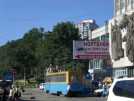 |
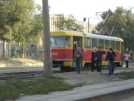 |
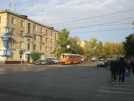 |
| Volgograd Trams |
Volgograd Trams |
Volgograd Trams |
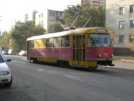 |
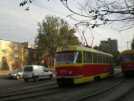 |
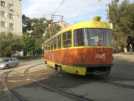 |
| Volgograd Trams |
Volgograd Trams |
Volgograd Trams |
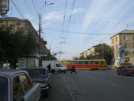 |
| Volgograd Trams |

Volgograd Metrotram
Excerpted from Wikipedia, the free encyclopedia
|
Volgograd Metrotram |
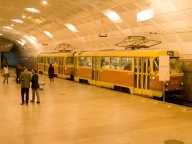 |
| Locale |
Russia |
| Transit type |
Light rail |
| Began operation |
5 November 1984 |
| System length |
13.5 km (8.4 mi) |
| No. of lines |
1 |
| No. of stations |
18 |
| Daily ridership |
136,000 |
| Track gauge |
1,520 mm (4 ft 11.7 in ) |
| Owner |
Volgograd Municipality |
| Operator |
Metroelectrotrans |
The Volgograd Metrotram is a light rail system
operating in Volgograd, Russia.
It consists of 18 stations on one line, paralleling the
Volga River from the northern suburbs of Volgograd to
its downtown core for a total length of 13.5 kilometres.
Most of the Metrotram line shares a surface-level right of
way with a previously constructed railway line for 10.2
kilometres, in a manner similar to that of the south leg
of the C-Train system in Calgary, for example; the three
downtown stations, on the other hand, were built underground
over a total length of 3.3 kilometres, meeting design standards
consistent with existing Russian metro systems.
The Volgograd Metrotram was inaugurated on 5 November 1984,
and presently serves 50 million passengers per year.
Stations
List of stations north to south:
- Traktornyy Zavod (Tractor Factory)
- Khlyebozavod (Bakery Works)
- Vodootstoy (Water-sediment)
- Bol'nitsa Il'icha (Ilich Hospital)
- Zavod "Barrikady" (Barrikady Factory)
- Tridsad' Pervaya Shkola (31st School)
- Stadion Monolit (Monolith Stadium)
- Zavod "Krasniy Oktyabr'" (Red October Steel Factory)
- Tridtsat' Devyataya Gvardeyskaya (39th Guards Rifle Division Street)
- Ploshchad' Vosrozhdyeniya (Revival Square)
- Dvoryets Sporta (Sports Palace)
- Mamayev Kurgan (Mamayev Kurgan)
- Tsentral'nyy Stadion (Central Stadium)
- Tsentral'nyy Park Kul'tury i Otdykha (Central Rest and Cultural Park)
- Ploshchad' Lenina (Lenin Square)
- Komsomol'skaya (Komsomol street)
- Pionyerskaya (Pioneers)
- Ploshchad' Chekistov (Chekists Square)
Under construction:
- Profsoyuznaya (Labour Unions)
- Teatr Yunogo Zritel'ya (Theatre for Young Spectators)
- Yel'shanka

For a more information about
Volgograd Metrotram see Wikipedia, the free encyclopedia

This page was retrieved and condensed from
(http://en.wikipedia.org/wiki/Volgograd_Metrotram)
see Wikipedia, the free encyclopedia, January 2008.
All text is available under the terms of the
GNU Free Documentation License
(see
Copyrights for details).
About Wikipedia
Disclaimers

This information was correct in January 2008. E. & O.E.

2007
You can click on these photos for an enlargement
 |
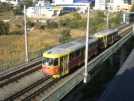 |
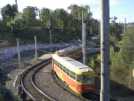 |
| Volgograd Trams |
Volgograd Metrotrams |
Volgograd Metrotrams |
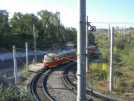 |
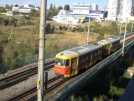 |
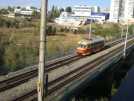 |
| Volgograd Metrotrams |
Volgograd Metrotrams |
Volgograd Metrotrams |

Volgograd
Excerpted from Wikipedia, the free encyclopedia
| Volgograd (English) |
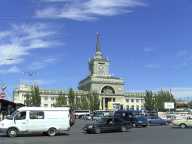
Volgograd train station |
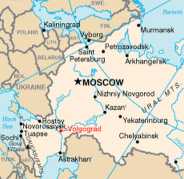
Volgograd on the map of European Russia |
Coordinates
48°42'N 44°31'E 44.517 Coordinates: 48°42'N 44°31'E 48.7 44.517 |
| Coat of Arms |
Flag |
 |
 |
| City Day - Second Sunday of September |
| Administrative status |
Federal subject
In jurisdiction of
Administrative center of |
Volgograd Oblast
Volgograd Oblast
Volgograd Oblast |
|
Local self-government |
| Charter |
Charter of the Hero City Volgograd |
| Municipal status |
Urban okrug |
| Head |
Roman Grebennikov (2008) |
| Legislative body |
City Duma |
| Area |
| Area |
565 km² (218.1 sq mi) |
|
Population (as of the 2002 Census) |
Population
- Rank
- Density
|
1,011,417 inhabitants
12th
1,790.1/km² (4,636.3/sq mi) |
| Events |
| Founded |
1555 |
| Town status |
1780 |
| Renamed Stalingrad |
1925 |
| Renamed Volgograd |
1961 |
|
Other information |
| Postal code |
400001..400138 |
| Dialling code |
+7 8442 |
|
Official website |
| http://www.volgadmin.ru |
Volgograd, formerly called Tsaritsyn (1598-1925) and Stalingrad
(1925-1961) is a city and the administrative center of
Volgograd Oblast, Russia.
It is 80 kilometres long, and situated on
the west bank of the Volga River.
History
Volgograd originated with the foundation in 1589 of the
fortress of Tsaritsyn at the confluence
of the Tsaritsa and Volga Rivers.
The fortress, which took its name from the local name
Sary Su (Yellow Water/River in the Tatar language),
was established to defend the unstable southern border
of Tsarist Russia and became the
nucleus of a trading settlement.
It was captured twice by Cossack rebels, under Stenka
Razin in the rebellion of 1670 and Yemelyan Pugachev in 1774.
Tsaritsyn became an important river port
and commercial centre in the 19th century.
The city was the scene of heavy fighting
during the Russian Civil War.
Bolshevik forces occupied it during 1918, but were
attacked by White forces under Anton Ivanovich Denikin.
During the battle for Tsaritsyn the Bolsheviks were pushed
back and surrounded at first, and only the actions of Josef
Dzhugashvili (nicknamed 'Stalin'), then local chairman of the
military committee, saved the city for the Bolsheviks.
Stalin did so by recalling Zhloba's 'Steel Division' from
the Caucasus which attacked the White Forces in the rear.
In honor of Stalin's efforts in defending the city, it was
renamed Stalingrad (literally: "Stalin city") in 1925.
The name change is typical of the way towns and cities were
re-named after Bolshevik leaders and heroes during Soviet times.
Under Stalin, the city became heavily industrialized and
was developed as a centre of heavy industry and
trans-shipment by rail and river.
During World War II (Great Patriotic War), the city of
Stalingrad became the center of the Battle of Stalingrad as well
as the pivotal turning point in the war against Germany.
The battle lasted from August 19,
1942 to February 2, 1943.

For a more information about
Volgograd see Wikipedia, the free encyclopedia

This page was retrieved and condensed from
(http://en.wikipedia.org/wiki/Volgograd)
see Wikipedia, the free encyclopedia, January 2008.
All text is available under the terms of the
GNU Free Documentation License
(see
Copyrights for details).
About Wikipedia
Disclaimers

This information was correct in January 2008. E. & O.E.
|